This is a story about the value of life...
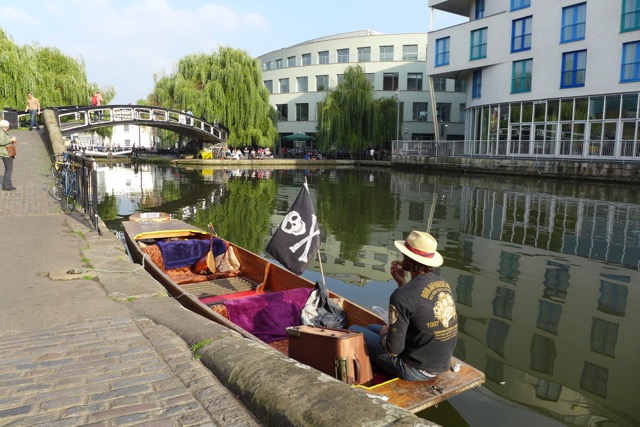
According to my anecdotal observations, people are taking more and more unnecessary risks with their lives and health. I've been heavily involved in this trend, since my teens, when I fought a fairly cowardly childhood with some fairly extreme stuff.
Everything from adrenalin sports to body modification seems to be going through exponential growth. The limit of what is survivable by a human seems to inspire a new generation of people who are pushing the envelope further than ever thought possible.
Let's talk about extreme sports, firstly. The guy who taught me how to rock climb had himself learnt using unimaginably dangerous equipment. The ropes had no stretch to them, and a fall could break your back just from the hard shock of the rope stopping you so suddenly. A lot of the equipment was improvised: large engineering nuts were threaded through with a bit of thin rope. People didn't even use harnesses to abseil and belay a lot of the time, they just let the rope slip around their bodies.
Kitesurfing might look extreme to you, but 15 years ago you basically hooked yourself up to an enormous kite that you couldn't release in an emergency, and you couldn't 'de-power'... that is to say that you couldn't let the wind go out of it in a strong gust, you were just yanked into the sky or dragged along.
I can't really talk about skydiving too much, as I've only done 21 jumps, but I was pulling my parachute at 5,000ft... plenty of time to pull my reserve parachute if I had a malfunction. Special care was taken to ensure that every skydiver was far apart from each other in the air, and it was scary when somebody fell past me and then opened their parachute only a few hundred metres away. If somebody crashes into you at 125mph, thousands of feet in the air, it's not going to end well.
Now we have climbers who will happily jump off a suspended platform and fall the whole length of their climbing ropes, just for the thrill... like a bungee jump. They trust their equipment so much that they actually choose to fall. Most of what I was taught as a climber by my old-school mentor was simply "don't fall".
Now we have kitesurfers who are jumping over hard objects that could kill them. One of the UK's best known kitesurfers famously jumped over Worthing Pier. I've had two close encounters with a pier myself, one of which destroyed my kite, and the other involved a jet-ski rescue of a friend's kite. When I learnt to kitesurf, the idea was to stay away from rocks, cliffs, buildings and anything hard that you might be splatted against by the pull of your kite.
Now we have skydivers who are wearing wingsuits and flying within a couple of feet of rocks, trees, cable cars, bridges, roads, houses... just about anything on a steep mountainside. When they open their parachute, they have barely enough time to unzip their arms from their wingsuits so that they can grab the control toggles, let alone pull the cutaway and reserve handle... but the reserve parachute would never open in time if they had a malfunction anyway.
Given that a parachute will malfunction every 10,000 jumps, and there's hard data that supports that statistic, then you can precisely say what the probability is of you dying from a BASE jump or wingsuit flight with a low canopy opening.
I've known people who've had accidents climbing, kitesurfing and skydiving, so why would I continue to do these dangerous things? Well, there has been incredible improvement in the quality of the equipment in just the last 15 years. However, I think the main reason is that us adrenalin junkies never think that an accident is going to happen to us... we tell ourselves that we're too skilled, too careful, too lucky... accidents happen to other people because they made a mistake. We all think we're infallible.
By my mid twenties I had experienced plenty of close calls, but thankfully never been hospitalised.
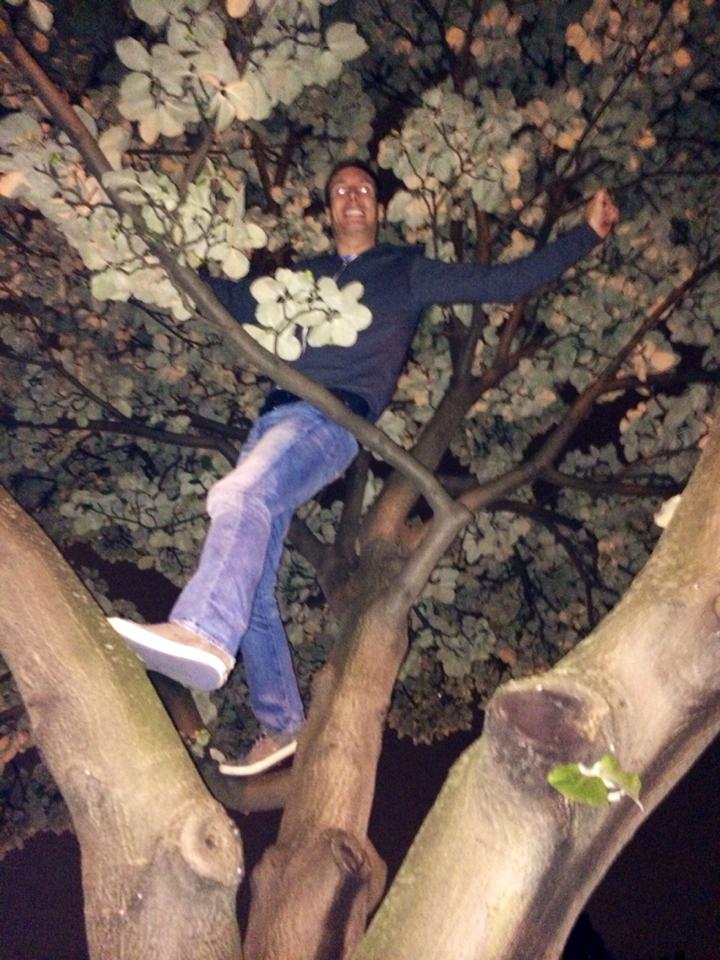
Getting into the extreme difficulty grades of rock climbing starts to be a game of russian roulette. The 'protection' that you can place to save your life if you do end up falling, starts to be very inadequate in certain parts of the climb. You have to accept that injury or death is going to occur if you fall in the wrong place at the wrong time.
Pulling off the hardest kitesurfing tricks can actually injure you pretty badly, even though you're doing them on water. One of the first times I tried to do a 360 degree spin, I accidentally looped my kite and hit the water going at about 40mph. It doesn't sound like much, but it could have easily broken a rib. The higher you go, and the stronger the wind, the more chance of you crashing into the water at high speed, and the more the water acts like a solid surface.
Waves are probably the biggest danger to a kitesurfer though, and without your kite you can be in big trouble. I once got pummelled into the seafloor down in Brighton, catching waves that had reached the size of houses. It was only because my kite pulled me to the surface and onto the beach that I didn't drown. Sadly, somebody we used to kitesurf with in Southbourne was not as lucky when he lost his kite and perished trying to swim to shore in big waves.
For a skydiver, you can obviously calculate the risk of having a double parachute failure, but most injury and death seems to occur when trying to land, when your parachute is actually open. At the place where I learnt, there was a motorway, a high-speed railway line, loads of buildings and trees and all sorts of other hard things that you could fly into, that would injure or kill you.
The very first time that I jumped, my lines were all twisted up. Not exactly a malfunction, but sometimes people have to cut away from their main parachute and open their reserve because the line twists are causing them to turn in a tight spiral downwards. Why was it not more off-putting that I actually had a problem with my parachute to sort out, while dangling in a harness, thousands of feet above the hard ground?
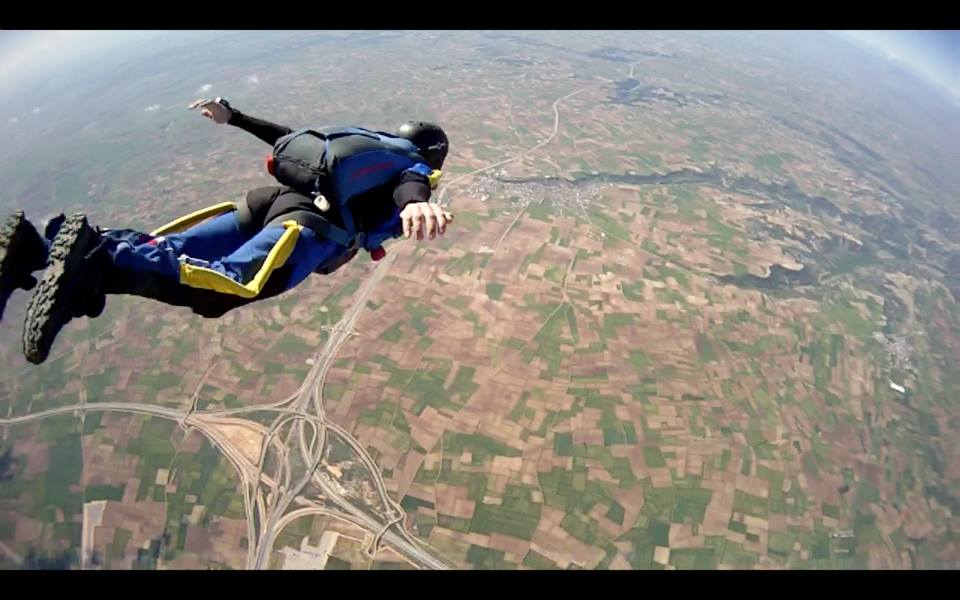
As you can see, I'm above a fairly major road junction, and heading towards a nearby town. The ground is approaching at over 120mph. I chose to jump out of the plane. Nobody made me do this. I decided to take the risk. An accident will never happen to me, right?
What I can say about all of this, is that personal experience is a very poor way to judge risk, but it's an unavoidably human thing to do... to base our perception of danger on our own individual lives, rather than looking at the wider statistics.
I've had a lot of hospital visits during my recent troubles, but I have no lasting health damage. Obviously, I never died. I didn't even feel much pain or discomfort that I can remember. To all intents and purposes, life has taught me that no matter what ridiculous risks I take, I seem to be immortal and virtually indestructible.
If I look at all the times I've put my life on the line, put my head in the lion's mouth, as it were... statistically I shouldn't be around to tell this tale. I should be more mindful of the fact that I'm one of the lucky ones... the one that got away, by the skin of his teeth. However, that's not how my psychology works. For every brush with death, that just seems to reinforce my belief that I can get away with unimaginable risk taking.
Why should it not be that way? For every harrowing event that you survive, why shouldn't it make you braver, less risk-averse. To all intents and purposes, the Universe seems to be speaking to you... that your life was spared, that you escaped catastrophic injury or death, just proves that you're special, you're different... you can put your life on the line and get away with it.
Here in the UK there are no predators, no wars, no unavoidable hazards. The biggest risk to your life is a road traffic accident. So, does it therefore seem logical that my latest adrenalin sport is playing in traffic? Deliberately dodging black cabs, red double-decker busses and Toyota Priuses driven by people who can barely drive.
I sawed my bicycle's handlebars down to the same width as my shoulders, so that I can fit through ridiculously small gaps, provided I keep my elbows in and ride like hell. Occasionally I see a gap, and then decide to abort at the last minute because I sense that something's not quite right. The sensible thing would be to avoid those touch-and-go situations altogether, but more often than not I'll lay my life on the line simply for the thrill of it.
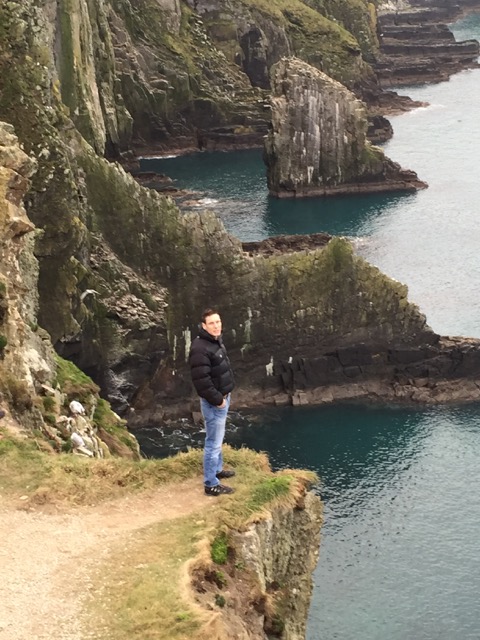
I never really think that living on the edge like this is disrespectful to those who haven't been as lucky as me. I do feel guilty about wasted NHS resources where I've been treated in hospital, but when doctors have told me how close I came to dying, it doesn't really have the intended effect.
Trying to scare somebody into taking less risks doesn't work, as we have seen with smoking. Printing "SMOKING KILLS" in big bold letters on cigarette packets looks particularly ironically ineffective, when a smoker is reaching into that packet twenty times for a 'cancer stick' before discarding the empty wrapper, and purchasing another box of fags.
I mentioned body modification, right at the start of this blog post. People are willingly submitting themself to the tattoo artist's needles, or the plastic surgeon's knife. These procedures are not without danger, but they are also painful, uncomfortable, as well as producing irreversible bodily changes.
You would have thought that people would have seen tattoo disasters, or had one of their own, and decided that making a permanent alteration to your body is a foolish thing to do. However, we find the opposite... once people have one tattoo, they often get more, and some people are going further, with piercings, stretched earlobes & lips, subdermal implants, deliberate scarring of their skin.
Ok, so London is gritty and urban, but there's a whole subculture where huge tattoos are totally normal and accepted. In every hipster cafe and trendy bicycle repair shop, you're likely to be served by people who have whole arms covered in richly coloured tattoos, necks, hands... these aren't the kind of thing you can cover up.
If you earn shit wages as a coffee shop barista or whatever, and there is literally zero hope of you ever being able to afford to buy your own home, why wouldn't you do something with your money that feels good? Blast all your cash on booze and tattoos. Money is just fun tokens... it doesn't buy you a lifestyle anymore, for most young people.
The long-term hopes of people have been dashed. There's no career ladder anymore. There are no good jobs full stop. There's just student debt and some low wage, and whatever you can do to fill the empty void. The idea of saving money for a rainy day is just insulting, when it's a hand-to-mouth existence.
This counter-culture of piercings, tattoos, beards, moustaches, vibrant hair colours and extreme haircuts. This fixation on image. So many selfies... I can empathise. I feel that I know where it's coming from. What have you got, other than the skin you live in, and the clothes on your back? Feel good in your own skin, because you'll never have a home to call your own, to feel good in.
You might as well get that big tattoo on your neck, because you're never going to work in an office, hoping to get that big promotion, like your Dad did. You might as well spend all your disposable income on alcohol and drugs and expensive coffee, because you're never going to be able to afford to settle down and start having kids in a nice big family home, as a housewife, like your Mum did.
The extreme sports are pretty much banished for those on a low income, so extreme drinking, extreme drug taking, extreme risk taking on your bike in traffic, extreme sexual behaviour... extremely short-term decisions. That's the only life opportunity that's offered. People have to get by however they can, and part of getting by is seeking reward, pleasure.
I don't think we're living in an era of hedonism at all. In fact there's a certain bleakness to everything. There's a certain amount of sorrow that is being drowned. Young people's lives are harder than you think, and those lives are very sparsely punctuated with what few highlights they can afford.
What was once a subculture, something extreme, something for the minorities, something for those who were excluded from the mainstream, is actually now becoming the mainstream. The "jocks" who are flawlessly good looking, fashionably dressed and are following the prescribed path of academic and sporting prowess, followed by a great career in a big company... these people are the freaks now.
I forget who it was who once said "if you want to be different, to stand out, then don't get a tattoo". Those words are ringing very true today.
I chose to get into extreme sports because I was bullied and ostracised a lot at school. Now it seems like anybody who's got the money is an off-piste snowboarder, kitesurfer, skydiver or whatever. It's no longer an exceptional thing to risk your life in pursuit of your little moment of happiness in an otherwise bleak existence.
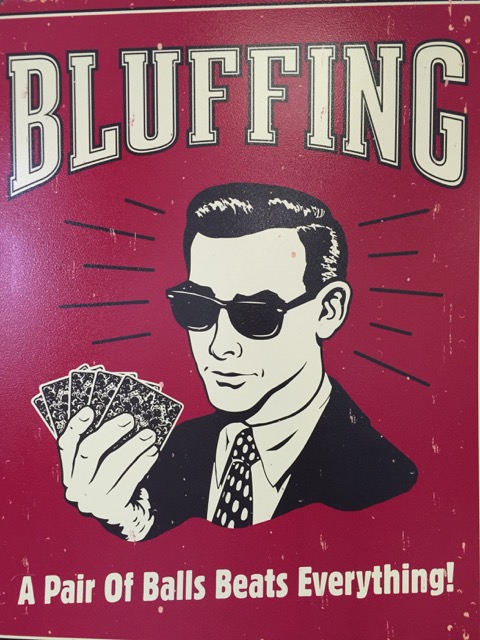
A strange thing starts to happen when you pressurise and threaten somebody who has spent a long time contemplating life and death decisions. Instead of being bullied, cowed, pushed and shoved in the way that you want them to, they double down: they will raise the stakes.
As danger approaches, I find that I run towards it rather than away. I don't try and make the last few pounds in my bank account last as long as possible... what would be the point of that? To disappear off the face of the planet with a whimper?
I'm a very bad person to play chicken with. If you think that risk of death, or anything inbetween is going to instill fear in me that will control my decisions, then you're very stupid and deluded.
If you think I'm the stupid one, you're wrong. Obviously I avoid pain and discomfort. It's actually the smart thing to do, to avoid the unwinnable battle, but at the same time to not submit yourself to a life of sustained misery. I'll avoid the fistfight with somebody who just enjoys the thrill of violence, but yet I'll use the very last of my energy, money - whatever I've got left - in some final roll of the dice that will leave me far more beaten and broken than any battering I could receive from somebody's fists.
You think that decisions like that are stupid? Well, you simply haven't calculated the odds. What do you do when you're dealt weak cards? Go all in. Push all your casino chips into the pile with an icy calm. Fortune favours the brave, and a life of cowardice is no life at all.
Some people are able to eke out a life, continuously looking over their shoulder in fear. Some people are able to live under Damocles' sword, with a continuous threat of redundancy, bankruptcy, mortgage default, reposession... not being able to feed and clothe their kids, not being able to pay the bills. Even though this miserable existence was once possible, the route is now barred. Why would you want it anyway?
Do I hanker for a time when I was drawing a regular salary, hoping for a big pay rise and bonus every year, paying my mortgage, trying to save enough money to put me ahead of the game? It's bullshit, you're never going to get your nose in front. You've been set up to fail from the start.
My instinct to nurture is rather unfulfilled, especially now that I no longer live with my cat, Frankie. However, I've got no skin in the game besides my own. There's absolutely no incentive to curtail my risk taking. There's absolutely no incentive to be subdued, beaten down into submission, and to accept an intolerably miserable existence. Of course I'd rather die.
It's not even about depression or mental illness. It's just a response to the world, to circumstances, to my environment. It's sane and rational to consider the final solution: a premeditated suicide.
Actually, when I think about my quality of life, I wouldn't give up the last few years for anything. I've had the ride of my life. If I skid into an early grave as a crumpled mess, then at least I lived. I know that "live fast, die young" is such a horrible cliché, but I 'get' it now. Having had both lives, I choose the one with extreme risk every time. Dying a long drawn out death of anxiety over whether my pension fund is big enough, is my idea of torture.
I wonder whether those young people, with their complete fixation on the short-term, share my lack of fear of death. I wonder if they have also made a rational decision to reject a life of constant anxiety over an unknowable future filled with pathetic threats... torturous death by a thousand cuts.
Why on earth would I want to be wealthy in my old age, when I'm stalked by cancer, cardiovascular disease and other age related shit that's going to make an active lifestyle increasingly improbable? I'm glad that I've lived and loved and lost, and now life hangs by the slenderest thread.
Am I being melodramatic? I don't care what you think, actually. You can call my bluff... I can't lose. I might end up without any fun tokens left, but that's all part of the thrill, the adventure... the joy of living your life, rather than waiting to die.
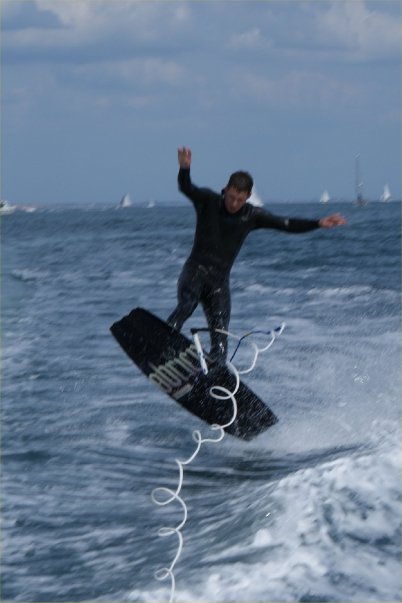
Cut the thread, and I'll fly
Tags: #adventure #kitesurfing #climbing #capitalism #career #suicide

